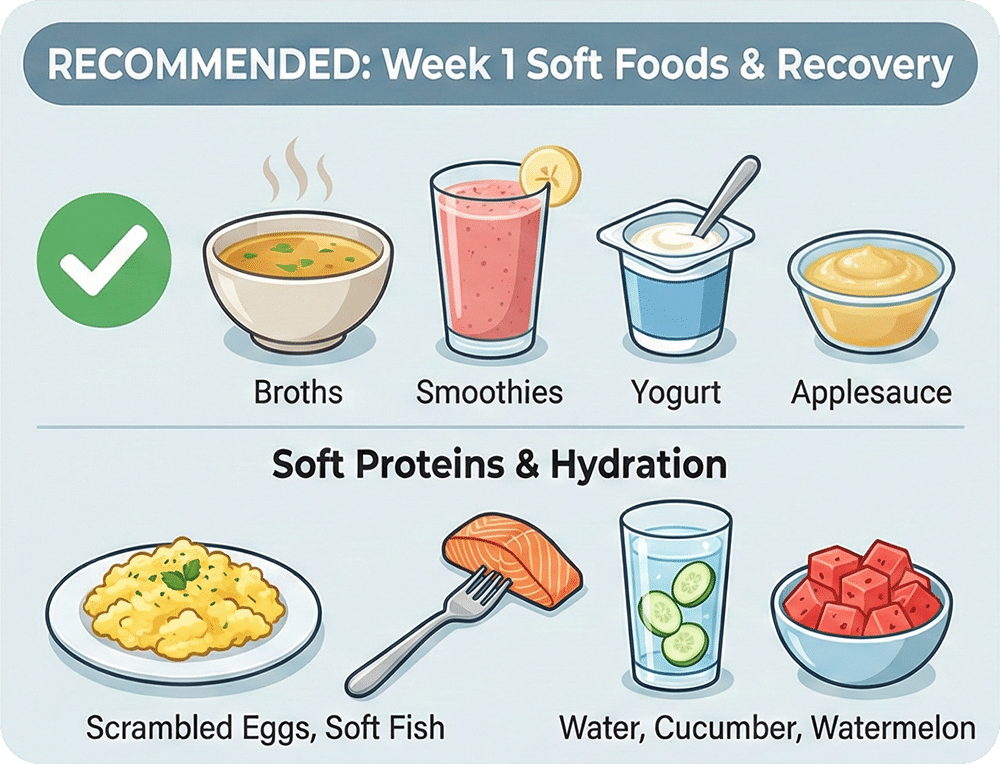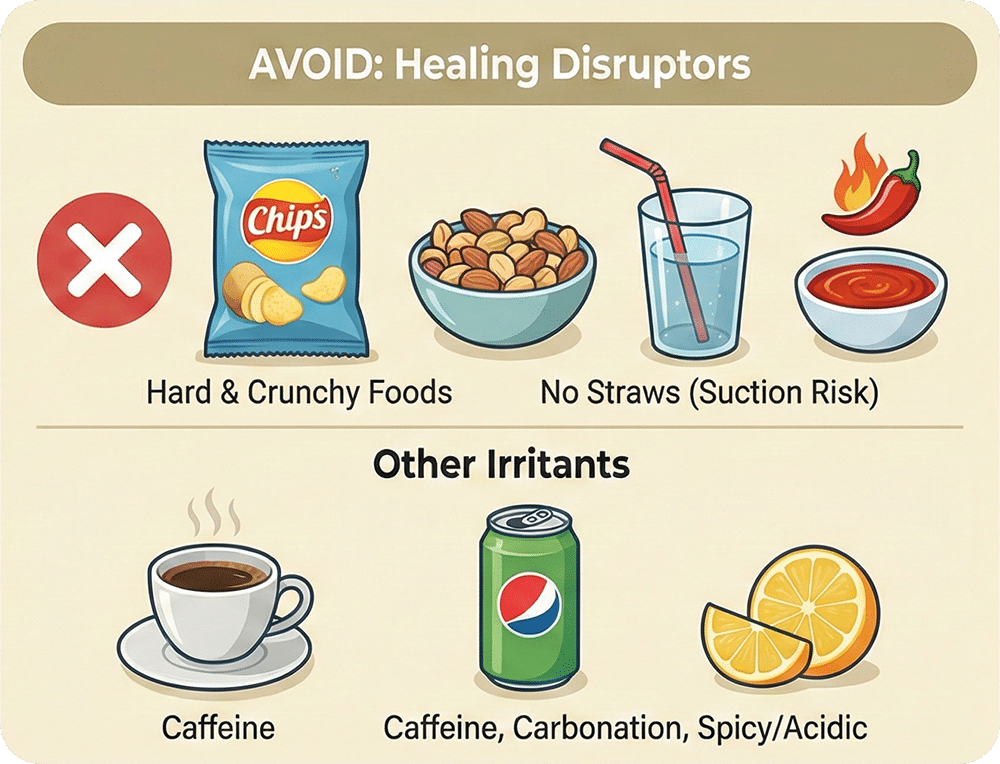Once buccal fat is eliminated, your diet greatly influences both speed and degree of recovery. Eating the correct foods can assist in reducing edema, mending tissues, and minimizing damage. Along with important vitamins and minerals, soft foods high in fluids and protein will assist your body’s healing capacity and might help ease pain following surgery.
Dr. Kirk Lozada is a field expert who provides you with credible dietary recommendations. His keen observations will help you to make judgments supporting a flawless and fast healing process. Advice from Dr. Lozada also addresses particular dietary requirements including lactose intolerance or the necessity for constant hydration.

Clinical studies show that nutrients like protein, fluids, vitamins A, C, and zinc play key roles in wound repair (Impact of Nutrition on Skin Wound Healing and Aesthetic Surgery – PMC, National Institutes of Health
What Should I Eat After Buccal Fat Removal?
Stick to a liquid and soft-food diet for the first week. This means broths, smoothies, yogurt, and applesauce. They’re easy on your healing incisions and help reduce swelling.
Straws create suction that can disturb the stitches and cause bleeding. Crunchy or sharp foods (like chips or nuts) can scratch the incision sites, making infection more likely.
- Drink lots of water and eat fluid-rich foods like watermelon and cucumbers.
- Choose low-sodium options to avoid extra fluid retention.
- Some patients also use vitamin C or bromelain supplements (with doctor approval) to help reduce bruising.
- Scrambled eggs
- Protein smoothies with banana or yogurt
- Soft fish like baked salmon
These options help rebuild tissue without irritating your mouth.
Most people slowly reintroduce regular foods after 1–2 weeks, depending on healing. Always follow your surgeon’s guidance—if chewing feels painful, return to softer foods until it’s comfortable.
- Hard, crunchy foods (chips, seeds, popcorn)
- Spicy or acidic foods (hot sauce, citrus)
- Sticky or chewy items (caramels, tough meats)
- Alcohol, caffeine, and carbonated drinks


Eating Right for Buccal Fat Removal Recovery
1. Fluid-Rich Foods to Decrease Swelling
Maintaining hydration—that is, drinking lots of water—after surgery is essential for the process that follows. Along with making sure water is consumed, eating meals high in fluids helps lower facial swelling and promotes healing in the weeks following surgery.
Your normal diet should include hydrous fruits. They provide fluids and vital nutrients, thereby helping in healing. Add high water content fruits including watermelon, strawberries, oranges, peaches, and cucumbers.
Healing calls for soups on a broth basis. When your mouth may be sensitive and help control fluid intake, they are a reassuring choice. For added nutrients, including lean proteins and soft veggies.
To maintain hygienic standards and control postoperative edema, use mouth rinses containing saline solution. For healing, you really should have broth-based soups and hydrating fruits.
2. Protein Options for Recovery
Smoothies with whey protein enhance the healing process, especially after buccal fat removal surgery. By blending whey protein into smoothies, you create a meal suitable for a soft-chew diet, important for recovery in the months after surgery. You can mix different fruits and vegetables to not only promote quicker healing but also reduce pain when eating.
Eggs, particularly when scrambled, are great protein-rich foods. They’re gentle enough for post-surgery nutrition without stressing the affected area. Including them in your diet contributes to healing and is compatible with a soft-chew diet.
3. Vitamins and Minerals to Boost Healing
Including these foods in your diet will help with rehabilitation following cheek reduction surgery. For instance, high in vitamin A soft-cooked vegetables such as carrots, sweet potatoes, and spinach help to enhance immune system strength and skin health. Likewise, broccoli’s and bell peppers’ vitamin C aids in collagen synthesis. A well-balanced diet including these will help with post-operative healing in the next months. Furthermore crucial is important to include zinc in your diet. Zinc strengthens your immune system and helps wounds to heal. Fortified cereals provide an excellent supply of zinc, thus they are a practical choice for breakfast or a snack since they help to promote a better recovery process.
4. Soft Foods to Minimize Chew Discomfort
Greek yogurt’s cold soothing quality helps to relax the mouth, so it’s a great choice for the days following surgery. It’s easy to eat and lessens the need for wide-mouth movements, therefore facilitating recovery. Choosing Greek yogurt instead of chewy foods will also help speed recuperation by greatly lessening of facial muscular strain. Comforts and nutrition abound from soft, non-chew foods like mashed potatoes. Their delicate texture fits well on a soft diet and lets one easily consume without straying sensitive areas.
5. Anti-Inflammatory Foods to Speed Up Healing
Including certain foods in your diet after plastic surgery can promote a smoother recovery process
- Eating mashed pumpkin and sweet potatoes could help speed healing. They include beta-carotene, a mineral necessary for tissue repair.
- Oats, a perfect texture, and a wealth of vital nutrients exist in soaked or overnight oats. They help to control inflammation in the crucial days following surgery and promote the healing of wounds.
Remain clear of smoking since it slows down healing and reduces the consumption of acidic foods to help in recovery by avoiding aggravation of inflammation. Remember that your post-operative treatment largely relies on a good diet.
6. Dairy Alternatives for the Lactose Intolerant
Given its support of post-plastic surgery recovery, almond milk is a good meal choice. Particularly soft and excellent for a liquid diet, almond milk puddings are good following operations like buccal fat extraction surgery. Smoothies enhanced with pea protein offer the required nutrients without including lactose. For patients, these are simple to stomach and can be created without extra salt to prevent inflammation, a worry following cosmetic surgery, particularly about restricted salty foods.
Philadelphia’s Premier Double Board Certified Facial Plastic Surgeon & Rhinoplasty Specialist.
Dr. Lozada is a facial sculpting expert who can help you achieve your desired aesthetic results.

7. Energy-Boosting Carbohydrates for Recovery
During the recuperation period—more especially, the week following surgery—a balanced diet is vital. Add energy-boosting carbohydrates:
- Glucose-free oatmeal or cream of rice: These soft, easy-to-digest choices are mild on sensitive areas following surgery and provide the required energy without causing the discomfort that might accompany hot or salty foods.
- Mashed sweet fruit: Perfect for snacking, these purees satisfy sweet cravings and offer a rapid energy boost without interfering with healing.

8. Oral-Friendly Snacks for In-Between Meals
After buccal fat removal surgery, choosing snacks fit for a soft diet is vital. Other mild choices like soft fruits assist heal and keep your mouth clean. Abstain of prickly foods to avoid aggravation. One must progressively switch to a normal diet. Review these choices:
Applesauce provides a smooth, fiber-rich texture perfect for beginning the return to your regular diet.
Soft and easy on delicate areas, bananas and peaches help you follow the soft diet following surgery.
9. Herbal Teas and Beverages to Promote Healing
Benefits of Green Tea
Green tea can reduce recovery time for buccal lipectomy patients by easing inflammation. Drinking it the day after surgery may help with swelling and lead to quicker healing.
The Role of Chamomile Tea
Particularly following surgery, chamomile tea helps with post-operative care. It can help general well-being, ease pain or drug-related nausea, and calm jaw muscles, thus facilitating faster recovery.
Case Study
Smooth Recovery and Amazing Results After Buccal Fat Removal & Chin Lipo
“Dr. Lozada and his team are phenomenal. Very knowledgeable, truly an expertise in his field. I am 2 months post my buccal fat removal and chin lipo and have healed so well and the results are amazing. Highly recommend!!”
Duyen N.
Buccal Fat Removal + Chin Liposuction
Duyen came to Dr. Lozada seeking a more defined jawline and slimmer facial contour. She opted for buccal fat removal to refine her cheeks and chin liposuction to sculpt her lower face. Two months later, her recovery has gone smoothly, with minimal downtime and results she describes as “amazing.”
- Immediate Post-Op (Days 1–3): Focused on a liquid and ultra-soft diet (soups, smoothies, yogurt). This helped protect the incisions inside her mouth from irritation.
- First Week: Transitioned to soft, easy-to-chew foods like scrambled eggs and mashed veggies. Duyen avoided straws, spicy foods, and anything crunchy, which could have disturbed healing.
- Weeks 2–4: Swelling gradually decreased. She reintroduced more solid foods, sticking to Dr. Lozada’s dietary guidelines for safe recovery.
- At 2 Months: Fully healed with no complications, back to her regular diet, and enjoying her new facial definition.
- Buccal Fat Removal: Carefully removed excess fat pads inside the cheeks to slim facial contours.
- Chin Liposuction: Small, hidden incisions allowed precise fat removal under the chin, creating a sharper jawline.
- Expert Guidance: Dr. Lozada and his team provided detailed dietary and aftercare instructions to minimize swelling and speed recovery.
- Noticeably slimmer, more sculpted cheeks
- A defined chin and jawline from lipo
- Smooth healing process, with swelling subsiding steadily
- High confidence and satisfaction at just 2 months post-op
- Diet Matters: Following a soft, protein-rich, and fluid-based diet early on helps speed healing after buccal fat removal.
- Combined Procedures: Pairing buccal fat removal with chin lipo can produce dramatic yet natural results in facial definition.
- Expert Care: Duyen highlights not only her results but also Dr. Lozada’s expertise and the supportive team experience.

Tips for Hydration and Nutrient Intake
Drinking during the morning of surgery or with some objects before surgery can cause some trouble most of the time. A straw will help to streamline the process.
- Drink water frequently—aim for every 15-30 minutes.
- Keep a water bottle close to encourage regular sips.
- Add hydrating foods such as fruits and soups to your regular diet.
It’s common to face some difficulty when drinking during the morning of surgery or with certain items before surgery. A straw can simplify the process.
- Choose a comfortable soft, bendable straw.
- Take great care with straws to not disrupt the impacted area.
- Properly clean straws to maintain oral hygiene.
Changing your fluid intake will assist your body repair and enable a return to your usual diet.

Consult with Dr. Kirk Lozada
If you have any doubts or need personalized advice on your recovery diet, consider scheduling a consultation with Dr. Kirk Lozada. His extensive training and innovative approach ensure a smoother recuperation period. A well-planned diet is important for healing after surgery, emphasizing the importance of professional dietary guidance in your recovery plan. With a focus on high-quality outcomes and minimal recovery time, Dr. Lozada’s expertise in facial plastic surgery assures you of professional guidance. Contact his office in Philadelphia to arrange a consultation tailored to your unique needs.